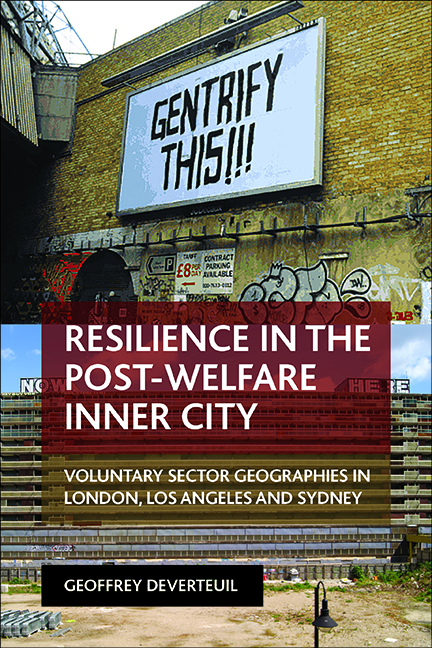 Resilience in the Post-Welfare Inner City
Resilience in the Post-Welfare Inner City Book contents
- Frontmatter
- Dedication
- Contents
- List of tables and figures
- About the author
- Acknowledgements
- Preface
- Part One Introducing resilience in the post-welfare inner city: conceptual and methodological considerations
- Part Two Case studies: spatial and social resilience in London, Los Angeles and Sydney
- Part Three Conclusions, critical resilience, commons and austerity
- References
- Index
Part Three - Conclusions, critical resilience, commons and austerity
Published online by Cambridge University Press: 10 March 2022
- Frontmatter
- Dedication
- Contents
- List of tables and figures
- About the author
- Acknowledgements
- Preface
- Part One Introducing resilience in the post-welfare inner city: conceptual and methodological considerations
- Part Two Case studies: spatial and social resilience in London, Los Angeles and Sydney
- Part Three Conclusions, critical resilience, commons and austerity
- References
- Index
Summary
Here I critically evaluate the utility of social and spatial resilience to the voluntary sector in residual service hubs, both in terms of resilience as a phenomenon to be studied in its own right but also its utility for social and critical geography, and for the study of the voluntary sector. I will argue in Chapter Eleven that resilience can be seen as a social and spatial struggle as important as any effort to secure the ‘right to the city’ (but garnering far less attention), with at least some critical potential. While much of the chapter is concerned with the real-world application of previously developed concepts about resilience, survival and gentrification, my centrepiece innovation is the presentation and consolidation of a new perspective on resilience captured by the ‘critical resilience of the residuals’. But Chapter Eleven by no means gives carte blanche to resilience – it is both a deconstruction and reconstruction of resilience, a stress-test following the Burawoy et al (1991) extended case study. Indeed, the results suggested some shortcomings to the concept which are difficult to surmount, prompting the need to supplement resilience with alternative concepts such as ‘commons’. In Chapter Twelve, I recast service hubs as commons before considering the more acute pressures from the post-2008 crisis of neoliberalism and emerging (post-welfare) arrangements within a context of ‘austerity urbanism’ (Peck, 2012) in the UK and US, but less so in Australia.
- Type
- Chapter
- Information
- Resilience in the Post-Welfare Inner CityVoluntary Sector Geographies in London, Los Angeles and Sydney, pp. 217 - 218Publisher: Bristol University PressPrint publication year: 2015


